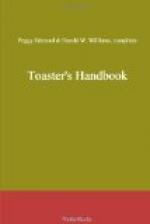“Oh, indeed!” cooed Mrs. Rochester, with a conventional show of interest. “I never knew her father was a piano-player.”
“He wasn’t,” replied the Colonel. “He was a drummer.”—G.T. Evans.
Recipe for an orchestra leader:
Four hundred and twenty-two movements—
Emanuel, Swedish and Swiss—
It’s a wonder the hand can keep
playing,
You’d think they’d
die laughing at this!
—Life.
’Tis
God gives skill,
But not without men’s hands:
He could not make
Antonio Stradivari’s violins
Without Antonio.
—George Eliot.
NAMES, PERSONAL
Israel Zangwill, the well-known writer, signs himself I. Zangwill. He was once approached at a reception by a fussy old lady, who demanded, “Oh, Mr. Zangwill, what is your Christian name?”
“Madame, I have none,” he gravely assured her.—John Pearson.
FRIEND-"So your great Russian actor was a total failure?”
MANAGER-"Yes. It took all our profits to pay for running the electric light sign with his name on it.”—Puck.
A somewhat unpatriotic little son of Italy, twelve years old, came to his teacher in the public school and asked if he could not have his name changed.
“Why do you wish to change your name?” the teacher asked.
“I want to be an American. I live in America now. I no longer want to be a Dago.”
“What American name would you like to have?”
“I have it here,” he said, handing the teacher a dirty scrap of paper on which was written—Patrick Dennis McCarty.
A shy young man once said to a young lady: “I wish dear, that we were on such terms of intimacy that you would not mind calling me by my first name.”
“Oh,” she replied, “your second name is good enough for me.”
An American travelling in Europe engaged a courier. Arriving at an inn in Austria, the man asked his servant to enter his name in accordance with the police regulations of that country. Some time after, the man asked the servant if he had complied with his orders.
“Yes, sir,” was the reply.
“How did you write my name?” asked the master.
“Well, sir, I can’t pronounce it,” answered the servant, “but I copied it from your portmanteau, sir.”
“Why, my name isn’t there. Bring me the book.” The register was brought, and, instead of the plain American name of two syllables, the following entry was revealed:
“Monsieur Warranted Solid Leather.”
—M.A. Hitchcock.
The story is told of Helen Hunt, the famous author of “Ramona,” that one morning after church service she found a purse full of money and told her pastor about it.
“Very well,” he said, “you keep it, and at the evening service I will announce it,” which he did in this wise:




